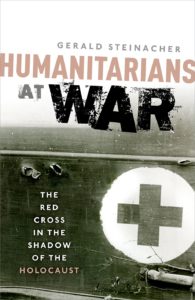GERALD STEINACHER is an associate professor of history and the the Hymen Rosenberg Professor of Judaic Studies at the University of Nebraska–Lincoln. He is the author of numerous publications on German and Italian 20th-century history, including Humanitarians at War: The Red Cross in the Shadow of the Holocaust, which has just been published by Oxford University Press. His previous work, Nazis on the Run: How Hitler’s Henchmen Fled Justice (Oxford University Press, 2011) was honored with the National Jewish Book Award in 2011.
 1. What drew you to writing this book?
1. What drew you to writing this book?
This latest book grew out of my work on my previous book, Nazis on the Run. This is something that often happens—I want to learn more and more about a particular aspect of a wider topic. In this case, I looked deeper into the history of the Red Cross and its challenges during World War II and the postwar years. Being a scholar of the Holocaust, I was most intrigued by the humanitarian responses to the genocide, but also to the war.
2. Where do you like to write?
I like to write in coffee shops, especially in parts of Central Europe. This probably has to do with my growing up in the kaffeehaus culture of Austria. Many Austrian writers and artists spent hours in coffee shops and did some of their best work there—Stefan Zweig, Oedon von Horvath, Helmut Qualtinger, Arthur Schnitzler, Arnold Schoenberg, and Peter Altenberg, just to name a few. To many, back then and still now, the kaffeehaus is an intellectual home.
3. Has growing up where you did have an effect on your interests or your writing?
It definitely has impacted me. I grew up on the former grounds of a concentration camp (transit camp of Innsbruck–Reichenau near the Italian–Austrian border). As a child, I heard things and wanted to know more. But when I grew up the adults were not forthcoming about the past. It was the 1970s and the 1980s in Austria—people did not want to talk about the past, much was swept under the rug. So I had to find my own answers.
4. What’s your favorite under-appreciated non-fiction work?
Two books come to mind and both are at the intersection of fiction and nonfiction: Decisive Moments in History, by the novelist Stefan Zweig, and The Conquest of America: The Question of the Other, by historian Zvetan Todorov. Everyone interested in history should read these books, as they are fantastic eye-openers, at least for me. Todorov was of French and Bulgarian descent—in other words, an insider in France but with an outsider’s outlook on French (but also Bulgarian) history. I can relate to that, given my own background as somebody who has lived in three countries (Austria, Italy, and now the United States).
5. What is your favorite time period to write about?
I am a Holocaust scholar, but I don’t have a favorite time period to write about. I write about the Holocaust because I strongly believe that our work as historians matters and that this is particularly true about this time period. Our knowledge of the Holocaust and its causes is often fragmented and distorted. I feel it to be my responsibility as a researcher and a teacher to educate and inform as many interested people as possible.
6. What’s next for you? What are you working on?
My students are currently reading The Sunflower, by Simon Wiesenthal. This is a book that at its core is about forgiveness. Can a Jew forgive a Holocaust perpetrator? Are there limits to forgiveness? What to do with the perpetrators? I am currently working on a book about Catholic responses to the Nuremberg trials and denazification. I want to know what was the Catholic leadership’s position on these issues of guilt and responsibility after 1945. These are big questions and there are no easy answers. But these questions are important, with much relevance today. MH





